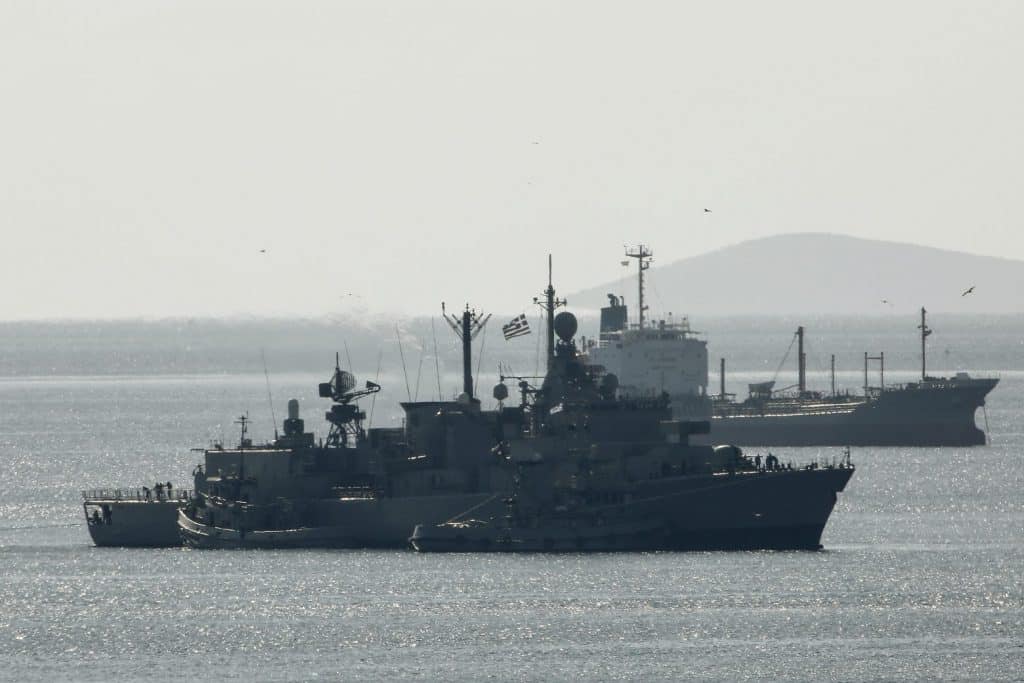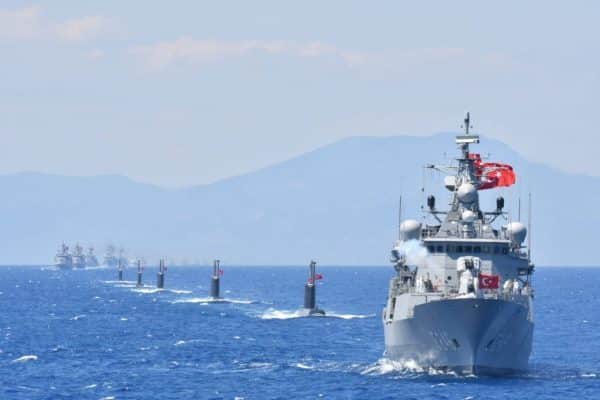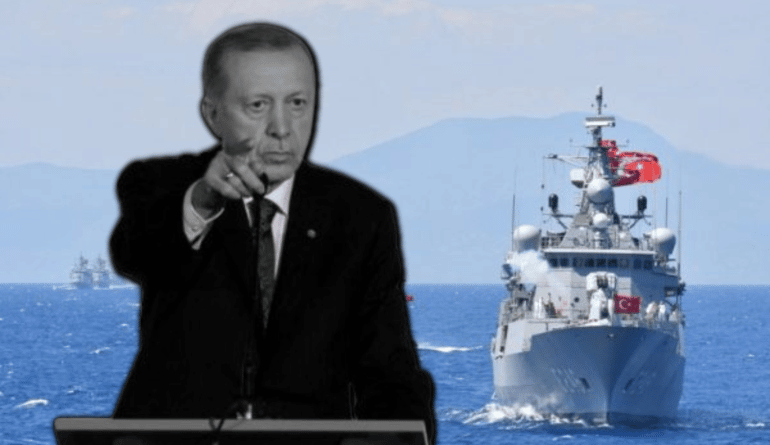The possibility of a conflict between Turkey and Greece - although inevitable - seems possible if one judges from the incendiary rhetoric of Recep Tayyip Erdogan, his allies, the pro-government press, but also from the statements even of the opposition in the neighbor, as an American estimates analyst.
Ryan Gingeras, a professor at the US Navy's Naval Postgraduate School in California, an expert on the history of the late Ottoman Empire and the author of five books on Turkey and numerous articles in the NY Times, Foreign Affairs and other publications, attempts to analyze the risks and the reasons why Erdogan would risk a war with Greece in the near future.
Read also: Turkey: Erdogan indirectly threatens Athens with war
The editor emphasizes what the president of Turkey has supported from time to time and especially what was announced in the last two days in Prague.
However, he hastens to point out that "at the same time, there are many reasons to doubt the seriousness of Erdogan's threats. A small majority of Turkish voters, according to a poll, remain convinced that his words are just an election strategy intended to "create an agenda" before next year's elections.
He adds that "a Turkish attack on Greece would certainly cause irreparable damage to Ankara's relationship with the United States, the European Union and NATO, especially given Greece's defense agreement with France and the strong US presence in the Aegean ».

The article in detail
“The islands you occupy do not bind us, we will do what is necessary when the time comes. As we say, we may come suddenly one night.' It has now been weeks since Turkish President Recep Tayyip Erdogan threatened to invade Greece, using the same language he used before previous Turkish military operations in Syria.
A large number of issues divide Athens and Ankara, but Erdogan has recently focused his anger on Greece's militarization of the Aegean islands. While the Greek military presence on the islands has remained largely consistent in recent decades, Ankara insists it is in violation of the 1923 and 1947 treaties that established Greece's sovereignty over the islands.
As we argued in June, a conflict between Greece and Turkey seems very likely.
A close reading of recent statements by Turkish officials, as well as the pattern of events in recent months, have only increased the risk. Erdogan's rhetoric, as well as his interests and ideology, suggest that Ankara may be willing to "go" to war.
Fears of a hot episode in the Aegean resurfaced again in early August with the launch of a new Turkish drillship reportedly headed for the Mediterranean. But despite high expectations in the Turkish nationalist press, the rig remained in Turkish territorial waters.
Turkish media and the Turkish Defense Ministry then reported that tensions flared when Greek warplanes harassed Turkish aircraft participating in a NATO mission over the Mediterranean. Days later, Turkish officials claimed that a Greek S-300 anti-aircraft system "locked" on Turkish F-16s near Crete.

With the two incidents occurring during the centenary celebrations marking the end of the Turkish War of Independence, Erdogan criticized Greece's deployment of Russian S-300s as evidence of Greece's… disloyalty to NATO. In this context, the president of Turkey threatened to come without warning to the islands of Greece.
Erdogan's words provoked the immediate reaction of Athens. Kyriakos Mitsotakis described his speech as deliberately aggressive. The US State Department then reiterated Washington's desire "for all parties to refrain from rhetoric and avoid actions that could further exacerbate tensions", stating that the sovereignty of the Greek islands of the Aegean "is not in dispute". Some observers inside and outside Turkey have argued that Erdogan's falling poll numbers prompted his outburst.
Regarding the issue of the militarization of the Greek islands, it is difficult today to find Turkish analysts willing to analyze the issue. At the same time reports in Turkish media refer to Greece's territories in the Aegean as "the islands under demilitarization regime (gayri askeri statüdeki adalar). The use of this expression was accompanied by a series of reports about the placement of troops and equipment on the islands. Multiple online sources have published articles with images of alleged illegal bases and airfields in the Aegean. Commentators repeatedly mention the existence of tens of thousands of Greek soldiers on the islands.
Recently, Turkey's official news agency and Turkish Radio and Television published drone photos showing Greek ships unloading dozens of armored vehicles on the Greek islands of Mytilini and Samos. Commentators in Turkey immediately seized on the images as evidence of Greece's desire to "militarize" the Aegean. The Turkish Foreign Ministry has repeatedly stated that failure to demilitarize the islands could formally challenge their sovereignty.
Erdogan himself has made it clear that Greece's actions in the Aegean are not the only source of tension. According to him, the mutual defense cooperation agreement between Washington and Athens in 2019 has caused the wrath of the Turkish president.
Washington's goal, it is often claimed, is to encircle Turkey. The lifting of the US arms embargo on the Republic of Cyprus, as well as US support for Kurdish militant activities in Syria, are often cited as further elements of this conspiracy. The sale of weapons by Washington to Greece, as Erdogan declared before the United Nations, is "a covert occupation". American and European support, he then warned Athens, "will not save you."

Is he bluffing?
At the same time, however, there are many reasons to doubt the seriousness of Erdogan's threats. A small majority of Turkish voters, according to a poll, remain convinced that his words are just an election strategy meant to "create an agenda" ahead of next year's elections. An even larger percentage, 64% according to the same poll, do not believe that there is "enmity between the Turkish and Greek people". Also, there is still a strong belief that a conflict between Greece and Turkey would have devastating effects on the fragile economies of both states.
Revenue from tourism, particularly from resorts on the Aegean coast, accounts for about 15% of Turkey's gross domestic product (and about 18% of Greece's). Both states depend heavily on sea shipping for trade. Before him COVID-19, 87% of Turkish trade was transported through coastal ports of entry.
Also, apart from any potential economic damage, the international consequences of the conflict would be no less severe.
Both the United States and the European Union have signaled a lack of tolerance for any attack on sovereign Greek territory. Also, neither Brussels nor Washington seem to embrace the Turkish claims of Greek aggression.
Kyriakos Mitsotakis has strongly stated that any direct threat to Greek sovereignty is a "red line" for the country, however there are other signs that Athens is preparing for the worst. Reports in July said the Greek military has begun deploying an "umbrella" against Turkish drones in the Aegean islands using Israeli technology. Additionally recently, Greek and French warships conducted joint exercises in the Aegean Sea as part of a wider mutual defense pact signed in 2021.
The risks of conflict, however, do not seem to have completely deterred Erdogan. For his part, Kemal Kilicdaroglu, head of Turkey's largest opposition party, condemned Erdogan's statement as "coming suddenly overnight". A real leader, he argued, would repeat Turkey's 1974 invasion of Cyprus and simply occupy Greece's "occupied" islands without threats or warnings.
A representative of the nationalist IYI Party echoed these views. Erdogan, he argued, had demonstrated his inability to lead by not making Greece "pay the cost" for sending armored vehicles to Samos and Mytilene.

The most striking display of pro-war sentiment came from Erdogan's coalition ally, nationalist leader Devlet Bakhceli. It is recalled that Bakhtseli in July was photographed happily holding a map depicting most of the Greek Aegean islands, including Crete, as Turkish territory. More recently, Bakhceli stated before the Turkish Grand National Assembly that the "sovereignty, property rights, maritime jurisdiction and airspace" of several Greek islands "undoubtedly and legally" belong to Turkey.
While the Turkish provocations do not necessarily indicate an intention for direct conflict, they do raise an obvious question: “What would Ankara hope to achieve by further escalation?
Why would Erdogan choose to take this course of action? Perhaps, as one commentator argued, Erdogan's personal frustration with Greece's increased power on the international stage will prompt him to escalate. The desire for an electoral boost could also play a role.
A Turkish attack on Greece would certainly cause irreparable damage to Ankara's relationship with the United States, the European Union and NATO, especially given Greece's defense agreement with France and the strong US presence in the Aegean.
In the shadow of the invasion of Ukraine, any attempt to occupy Greek territory would make Erdogan look like Russian President Vladimir Putin. Given these circumstances, it seems almost impossible to imagine Erdogan dismissing the serious diplomatic, political and economic consequences of such an action. However, history has shown that he may be willing and able to endure the consequences. In 1974, Turkey invaded Cyprus despite the damage it caused to its relations with the United States and NATO. Also in Syria, Erdogan made good on his invasion threats.
Therefore if Erdogan believes, as one columnist put it, that "America is our enemy, not Greece," then it is possible that he sees the risks of a rupture as a sad but substantial price to be paid in the name of of Turkish national security".
Source: in.gr
